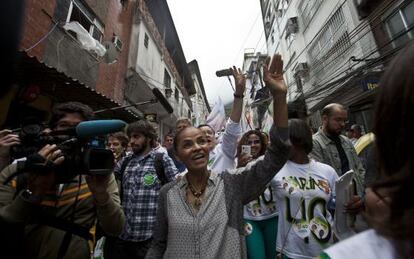Brazil’s wild card presidential candidate falls prey to her own contradictions
Observers criticize Marina Silva for caving in to religious pressures and creating inconsistent platform


Brazil’s presidential electoral campaign is swerving at increasingly dizzying speeds around wild card candidate Marina Silva who was nominated on the Brazilian Socialist Party (PSB) ticket after the tragic death of Eduardo Campos in a plane crash on August 13. Campos’ death shocked the nation and revolutionized the race. Since then, Silva, who learned how to write when she was 16 years old and served as Lula’s environment minister, has been climbing in the polls. She seems unstoppable. The latest poll, published on Friday, put the charismatic presidential hopeful neck and neck with President Dilma Rousseff of the Workers’ Party (PT) in the first round. The survey suggested that Silva would score a definitive victory in the second round with a comfortable 10-point lead.
Still, the contradictions surrounding her candidacy, which her rivals Rousseff and Aécio Neves of the Brazilian Social Democratic Party (PSDB) have rushed to point out, are slowing her down.
One of those not-so-slight contradictions came up after Silva presented her election platform at an event in São Paulo on Friday. The Brazilian media highlighted one of her most innovative and brave measures, a constitutional amendment to legalize same-sex marriage. As soon as the news spread, evangelical pastors who oppose such changes began to criticize the PSB candidate. “Marina Silva’s program is a shameful defense of the gay agenda,” Pastor Silas Malafaia tweeted to his 774,000 followers.
It only took four messages from Pastor Malafaia for Marina Silva to deny her own political agenda”
Silva is herself an evangelical Christian and her membership draws a substantial number of alliances, votes, not to mention pressures. On Saturday, the candidate’s camp published a statement saying that there was “a mistake” in the proposal and that her real goal was to “guarantee same-sex couples’ rights to civil unions,” a more lax version that does not carry constitutional protection. Basically, a step backwards.
Deputy Jean Wyllys, a member of minority Socialist party Partido Socialismo e Libertade no Rio de Janeiro (PSOL-RJ) and a gay rights activist, soon accused Silva of caving in on her first challenge. “It only took four messages from Pastor Malafaia for Marina Silva to forget the promises she had made at a televised public event just 24 hours before and to deny her own political agenda.”
Aécio Neves brought up another contradiction in Silva’s platform. On Saturday, the PSDB candidate said Silva’s economic proposals looked like they had been copied from his own traditionally neoliberal program, meaning the former environment minister had created a liberal economic plan that would give a freer hand to market agents and cut back on government intervention while promising to increase social programs and government assistance. Neves also accused Silva of promoting a “messianic” brand of politics which, in the long run, will only disappoint voters and the country. During her campaign events, Rousseff also focused on attacking Silva, saying that she wants to reduce government-subsidized housing. The attacks from both sides clearly show that Silva has become the woman to beat, the dangerous enemy among these three contenders.
Silva’s position in the campaign will become even clearer as the rivals meet for their second televised debate on Monday. In the last debate, Rousseff and Neves ignored Silva. They threw themselves into a duel and thus turned their backs on the star candidate. But on Monday they will have no choice but to face the PSB contender in order to try to stop her ascent.
Brazil will hold its presidential elections on October 5.
Translation: Dyane Jean François
Tu suscripción se está usando en otro dispositivo
¿Quieres añadir otro usuario a tu suscripción?
Si continúas leyendo en este dispositivo, no se podrá leer en el otro.
FlechaTu suscripción se está usando en otro dispositivo y solo puedes acceder a EL PAÍS desde un dispositivo a la vez.
Si quieres compartir tu cuenta, cambia tu suscripción a la modalidad Premium, así podrás añadir otro usuario. Cada uno accederá con su propia cuenta de email, lo que os permitirá personalizar vuestra experiencia en EL PAÍS.
¿Tienes una suscripción de empresa? Accede aquí para contratar más cuentas.
En el caso de no saber quién está usando tu cuenta, te recomendamos cambiar tu contraseña aquí.
Si decides continuar compartiendo tu cuenta, este mensaje se mostrará en tu dispositivo y en el de la otra persona que está usando tu cuenta de forma indefinida, afectando a tu experiencia de lectura. Puedes consultar aquí los términos y condiciones de la suscripción digital.








































